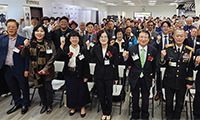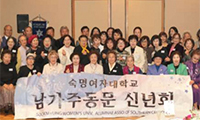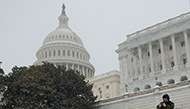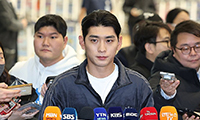S. Korea to Stimulate Outbound Investment
Staff Reporter
The government will ease rules restricting purchases of overseas properties to encourage individual and foreign investors to invest more abroad, a move to spur the outflow of funds amid bloated foreign exchange reserves and a stronger won against the dollar.
It will unveil details of deregulation measures, including the lifting of regulations on overseas property investment by the end of June to further liberalize flows of capital out of the country, the Ministry of Finance and Economy (MOFE) said Monday.
The government has recently launched a public-private joint taskforce composed of government ministries, universities and research institutes, to map out a comprehensive set of measures to deregulate restrictions on outgoing investment.
Local investors will be allowed to purchase overseas properties through real estate investment trust funds managed by the asset management firms, an MOFE official said.
The government is also studying ways to relax rules requiring the domestic institutional investors to obtain prior approval from the regulators for the trading of financial derivatives products in overseas markets.
Various state funds are expected to invest more easily in foreign stock markets.
It plans to expand the limit of individuals’ foreign investment, currently set at $1 million, while drastically easing regulations restricting housing purchases overseas.
Under the current rules, individuals are allowed to buy a house or apartment for the purpose of residing in foreign countries for more than two years, with the value of the house restricted to $300,000.
A local media reported yesterday that the ministry would allow Korean parents to purchase houses for their children studying in foreign countries. But the ministry rejected the report, saying it has never considered such measures.
Many Korean parents have been complaining that the restriction does not reflect the reality as they had no other choice but to use illegal means to buy houses for their children enrolled at schools in foreign countries like the United States and Canada.
The government has recently shifted its policy from focusing only on bringing in foreign capital into the country and limiting an outflow of capital to promote overseas investment by domestic individuals and companies.
A change in the government policy is mainly attributable to an accumulation of a large amount of foreign currency reserves and rising trade surpluses, which have strengthened the value of the Korean won against the U.S. dollar over the past year.
The Korean government has heavily intervened in the domestic and foreign currency markets to keep the value of the won low against the greenback by buying dollars.
The intervention is aimed at keeping a stronger won from hurting competitiveness of exports overseas.
It has resulted in an ``excessive’’ increase in the amount of dollars the government holds as reserves, incurring hundreds of billions of won for interest payments each year on state bonds it issued to purchase dollars.
leehs@koreatimes.co.kr
스마터리빙
more [ 건강]
[ 건강]이제 혈관 건강도 챙기자!
[현대해운]우리 눈에 보이지 않기 때문에 혈관 건강을 챙기는 것은 결코 쉽지 않은데요. 여러분은 혈관 건강을 유지하기 위해 어떤 노력을 하시나요?
 [ 건강]
[ 건강]내 몸이 건강해지는 과일궁합
 [ 라이프]
[ 라이프]벌레야 물럿거라! 천연 해충제 만들기
 [ 건강]
[ 건강]혈압 낮추는데 좋은 식품
[현대해운]혈관 건강은 주로 노화가 진행되면서 지켜야 할 문제라고 인식되어 왔습니다. 최근 생활 패턴과 식생활의 변화로 혈관의 노화 진행이 빨라지고
카테고리 최신기사
- 4기 폐암 치료
- “내가 고급 조커? 난 주전 원해” 뮌헨과 작별 원하는 김민재, ‘첼시행 급물살’ 이유 있었다... EPL 풀타임 출전 보장
- ‘한국축구 대참사’ 승부차기 끝 베트남에 사상 첫 충격패, U23 아시안컵 4위 마감
- “신께 맹세한다, 이건 아니잖아!” 김민재 이런 일은 처음, 얼마나 억울했으면... ‘이례적’ 극대로
- ‘860억 OK’ 이강인 끝내 아틀레티코행 급물살... 역대급 이적료→화려한 스페인 복귀 가능성
- 홍명보호, 월드컵 베이스캠프로 과달라하라 확정
- “한국의 친선경기 요청 거절” 월드컵 대비 평가전 유력 후보 튀니지전 무산 확정
사람·사람들
more
광복회 미국 서남부지회 신년하례식
광복회 미국 서남부지회의 2026년 신년하례식이 지난 17일 LA 한인회관에서 140여 명의 내외빈과 한인사회 주요 인사들이 참석한 가운데 열…

숙명여대 남가주 동문회 신년회
숙명여자대학교 남가주 동문회는 지난 17일 세리토스 퍼포밍 아트센터에서 동문과 가족들이 참석한 가운데 신년회를 개최했다. 이날 행사에 참석한 …
경북중·고 남가주 동창회 정기총회
경북중·고 남가주 동창회(회장 지성호·49회)는 지난 15일 부에나팍 소재 경복궁 연회홀에서 2026년 신년하례회 및 정기총회를 성황리에 개최…
[한인단체 신년 인터뷰] L A 체육회 허연이 회…
재미대한 LA체육회(이하 LA체육회)의 사상 첫 여성 회장으로 취임한 허연이 회장이 새해를 맞아 본보와 가진 신년 인터뷰에서 “LA 한인사회가…
LA한인회장 이스라엘 방문 윌셔템플 랍비 초청으로 1
LA 한인회 로버트 안 회장LA 한인회 로버트 안 회장이 한인과 유대 커뮤니티 간 연대와 협력 강화를 위해 이스라엘 방문길에 올랐다. LA 한…
많이 본 기사
- 이민당국 잇단 총격에 공화당도 비판…민주, 장관 탄핵 요구
- “모두 일어나야”…오바마·클린턴, 잇단 총격사망에 저항 촉구
- LA 교통사고 대책 ‘방치’… “주민들 죽어간다”
- 정의선, 캐나다 잠수함 특사단 합류…수소 생태계 협력 타진
- 강훈식, 캐나다로 출국… “60조 잠수함 수주, 韓 진심 전할 것”
- 한덕수 ‘대선 선거법 위반 사건’ 재판, 광주서 서울로 이송
- 이진형 스탠퍼드 교수, AI 뇌진단 플랫폼 ‘뉴로매치’로 에디슨상
- 트럼프, 이민당국의 시민 살해에 “민… 1
- 이민당국, 사살된 미국인 2명에 “용의자들” 지칭…시위대 분노
- 쿠바붕괴는 시간문제(?)
- 은 $100·금 $5,000… 한인들도 매입·투자 ‘열렬’
- ‘이럴수가!’ 이정후, 알고보니 1시간 아닌 4시간 구금→심지어 통역은 미국서 한국 돌아갔다
- 맨손으로 목숨걸고…美등반가, 타이베이101 정상 올라 셀카 찰칵
- 해외 증시는 불타는데… 미국 증시는 왜 갈팡질팡?
- 캐나다 총리 “中과 FTA 안하는데…” 트럼프 관세위협 반박
- 이해찬 前총리 시신 27일 국내로 운구…서울대병원에 빈소 마련
- 기내 보조배터리 사용 전면 금지
- 미네소타 대기업 CEO들 “즉각적인 긴장완화 촉구” 공동성명
- 김우빈이 찍은 신민아 신혼여행 사진..스페인 목격담 인증
- 차은우 200억 탈세, 가족만?..조… 1
- ‘청룡장’ 페이커, 현충원 안장 가능할까… “심의통과시 가능”
- 정철원, 숙소서 외도했나..김지연 “이제 와서 무슨 아들을 위해?” 분노
- 양세형, 8살 연하 아나운서 박소영과 핑크빛 로맨스.. “먼저 연락”
- “중남미는 내 앞마당” 미국의 ‘레짐 체인지’ 흑역사는 계속된다
- 러 “우크라 내 서방군 주둔 불가”…3자 회담 뒤 원칙 재확인
- 美 초강력 눈폭풍 강타로 항공편 1만편 결항·최소 8명 사망
- 총기 소지했다고 사살?…보수진영도 이민단속·시위대응 비판
- ‘V0’ 김건희 28일 첫선고… ‘통일교 금품’ 권성동·윤영호도 결론
- 신기루, 단발 아닌 긴머리..♥남편도 못 알아볼 얼굴·분위기 “내가 떠나는 날”
- 연방정부 셧다운 가능성…야당, 국민 쏴죽인 이민당국에 예산 거부
- 인사청문 이틀만 낙마 李… ‘위장미혼’ 등 줄줄이 의혹에 치명타
- 그린란드 갈등에 불붙은 금값…5천달러 사상 첫 돌파
- ‘이혜훈 늪’에 빠진 기획예산처…낙마… 1
- “내가 고급 조커? 난 주전 원해” 뮌헨과 작별 원하는 김민재, ‘첼시행 급물살’ 이유 있었다... EPL 풀타임 출전 보장
- 美 ‘겨울 눈폭풍’ 예보에 뉴욕행 등 국적사 항공편 18편 취소
- ‘내란가담’ 박성재 재판 시작… ‘한덕수 중형’ 이진관 판사 심리
- 美겨울폭풍에 100만가구 정전, 석유·가스공급 차질…남부도 타격
- 연방법원, 미네소타 이민당국 요원 총격사건 증거보존 명령
- 초강력 눈폭풍 강타…70만 가구 정전·항공편 대거결항
- 유럽 극우, 트럼프 그린란드 야심에 화들짝…MAGA와 결별
- 초강력 눈폭풍 강타…70만 가구 정전·항공편 대거결항
- ‘아프간 발언’에 아차 싶은 트럼프 “영국군, 사랑한다, 영원히!”
- 이민당국 자국인 사살 진실게임…트럼프… 2
- 트럼프, ‘中관계개선’ 캐나다 연일 압박… “체계적으로 자멸중”
- 이민당국총격에 1월들어 시민 2명 사망…미네소타발 분노 확산
- 트럼프 “백악관 연회장 건설 상당히 … 1
- 이해찬 前총리 별세… 군사정권·민주화 거친 ‘민주세대 상징’
- ‘황제도 못한 대기록’ 조코비치, 테니스 최초 메이저 통산 400승 대업
- “사람 돕는데 헌신적”…ICE에 사살된 미국인은 중환자실 간호사
- ‘국내 최강 입증할까’ 임종훈-신유빈, 종합선수권 4강 진출 ‘순항’
1/5지식톡

-
 로스앤젤레스 지역
0
로스앤젤레스 지역
0현재 캘리포니아 에서 양로보건센터 운영중인사람중에서 로스앤젤레스 Branch Open 관심 있는 사람 찾습니다 양로보건센터 운영 라이센스 있는 사람 찾습니다 장소 리스 합니다 로스앤젤레스 지역 양로보건센터 자리 리…
-
 중/고등학생 국제 “논리” 올림피아…
0
중/고등학생 국제 “논리” 올림피아…
0International Logic Olympiad (ILO) 2026 개최 안내국제 무대에서 당신의 사고력을 시험해 보세요! 전 세계 중학생, 고등학생들에게 논리와 문제 해결 능력을 빛낼 수 있는 기회를 제공하는…
-
 한국 안경을 무료 배송으로 받아보실…
0
한국 안경을 무료 배송으로 받아보실…
0안녕하세요. 서울 안암동에 위치한 ‘보고싶다 안경원’입니다.저희는 다년간 한국 고객분들께 착용감 좋은 안경테와 한국안경브랜드,고압축 도수 렌즈를 합리적인 가격에 제공해온 안경 전문점입니다.이번에 해외 배송이 가능해…
-
 미 육군 사관학교 West Poin…
0
미 육군 사관학교 West Poin…
0https://youtu.be/SxD8cEhNV6Q연락처:wpkapca@gmail.comJohn Choi: 714-716-6414West Point 합격증을 받으셨나요?미 육군사관학교 West Point 학부모 모…
-
 ☝️해외에서도 가능한 한국어 선생님…
0
☝️해외에서도 가능한 한국어 선생님…
0이 영상 하나면 충분합니다!♥️상담신청문의♥️☝️ 문의 폭주로 '선착순 상담'만 진행합니다.☎️ : 02-6213-9094✨카카오톡ID : @GOODEDU77 (@골뱅이 꼭 붙여주셔야합니다…
케이타운 1번가
오피니언

LA 총영사관, 재외공관 개혁에 앞장서라

로컬 경제 파괴하는 무차별 이민 단속
 캐슬린 파커 워싱턴포스트 칼럼니스트
캐슬린 파커 워싱턴포스트 칼럼니스트 [캐슬린 파커 칼럼] 미국서도 언론의 자유는 언제나 취약했다
 유경재 나성북부교회 담임목사
유경재 나성북부교회 담임목사 [한국춘추] 정직함의 힘
 이희숙 시인·수필가
이희숙 시인·수필가 [금요단상] 청계천을 흐르는 빛의 기억
 조영헌 / 고려대 역사교육학과 교수
조영헌 / 고려대 역사교육학과 교수 [역사 속 하루] 건륭제의 마지막 남순
 서정명 / 서울경제 논설위원
서정명 / 서울경제 논설위원[만화경] 포니와 아틀라스
 이희수 한양대 문화인류학과 명예교수
이희수 한양대 문화인류학과 명예교수 불씨 여전한 이란 사태 파장 주시해야
 수잔 최 한미가정상담소 이사장 가정법 전문 변호사
수잔 최 한미가정상담소 이사장 가정법 전문 변호사 [수잔 최 변호사의 LIFE &] 새해에 드리는 기도
1/3지사별 뉴스

뉴욕일원 북극한파·눈폭탄 ‘초비상’
뉴욕과 뉴저지 일원에 이번 주말 북극한파와 눈폭탄이 휘몰아칠 것으로 예보되면서 초비상이 걸렸다. 미 국립기상청에 따르면 23일 오후부터 북극의…
팰팍서 이틀연속 ICE 기습 체포작전 “우리도 타깃되나” 한인들 벌벌

폭설+‘북극한파’…워싱턴 비상
이번 주말 워싱턴 일원에 강력한 겨울 폭풍과 함께 기록적인 북극 한파가 몰아칠 것이라는 예보가 나오면서 기상당국이 대비를 당부하고 있다.국립기…
다시 등장한 페어팩스 카지노 법안

초강력 눈폭풍 강타…70만 가구 정전·항공편 대거결항
강력한 눈폭풍이 미국에 상륙하면서 폭설과 결빙으로 인한 대규모 정전 사태와 항공편 결항 등 피해가 이어지고 있다.눈 폭풍은 남부를 거쳐 중부와…
이정후, LA공항서 일시 구금후 풀려나

오늘 하루 이 창 열지 않음 닫기 


















































.png)


댓글 안에 당신의 성숙함도 담아 주세요.
'오늘의 한마디'는 기사에 대하여 자신의 생각을 말하고 남의 생각을 들으며 서로 다양한 의견을 나누는 공간입니다. 그러나 간혹 불건전한 내용을 올리시는 분들이 계셔서 건전한 인터넷문화 정착을 위해 아래와 같은 운영원칙을 적용합니다.
자체 모니터링을 통해 아래에 해당하는 내용이 포함된 댓글이 발견되면 예고없이 삭제 조치를 하겠습니다.
불건전한 댓글을 올리거나, 이름에 비속어 및 상대방의 불쾌감을 주는 단어를 사용, 유명인 또는 특정 일반인을 사칭하는 경우 이용에 대한 차단 제재를 받을 수 있습니다. 차단될 경우, 일주일간 댓글을 달수 없게 됩니다.
명예훼손, 개인정보 유출, 욕설 등 법률에 위반되는 댓글은 관계 법령에 의거 민형사상 처벌을 받을 수 있으니 이용에 주의를 부탁드립니다.
Close
x